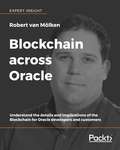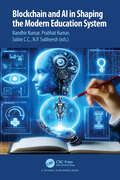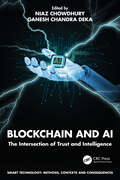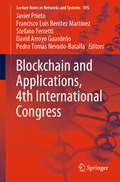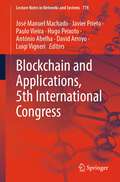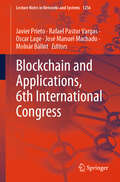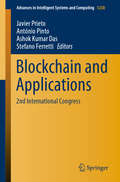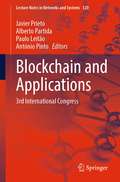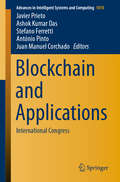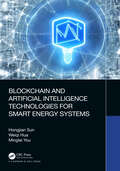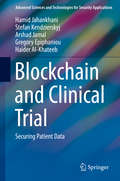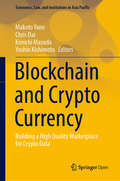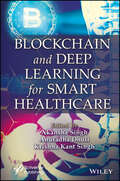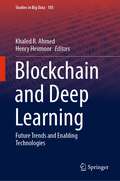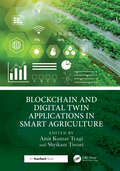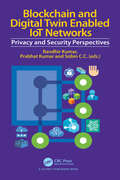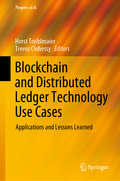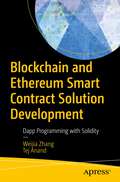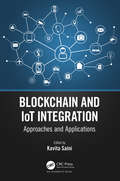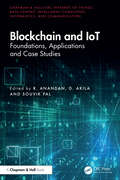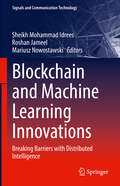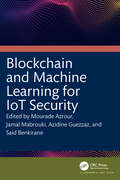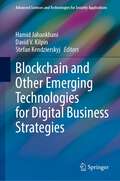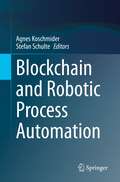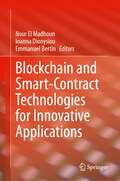- Table View
- List View
Blockchain across Oracle: Understand the details and implications of the Blockchain for Oracle developers and customers
by Robert Van MölkenLearn what the Blockchain is, what the differences between available blockchain platforms are, how to work with Oracle’s Blockchain Cloud Service, and how Blockchain can change the direction of your Oracle work and the focus of your customers.Key FeaturesA professional orientation of the Blockchain for Oracle developers and customersLearn what the Blockchain is and how it will affect for you and your customersLearn how blockchain will disrupt traditional cross-organizational applicationsImplement your own Blockchain on Oracle and develop your first smart contract Industry directions of the Blockchain to help you decide where to develop your skillsBook DescriptionBlockchain across Oracle gives you the professional orientation to Blockchain that you need as an Oracle developer in today’s changing world. Written and prepared for you by Oracle Developer Champion Robert van Mölken, this book gets you up to speed with the details of the Blockchain - core concepts, how to implement Oracle’s Blockchain Cloud Service, industry implications for the Blockchain, and how the Blockchain will affect your Oracle customers.Robert van Mölken introduces you to the history and concepts of the Blockchain. You’ll really get to understand the Blockchain inside and out, as an Oracle developer or solution architect. You’ll understand the Blockchain flow, and how the hashes and chains create a new decentralised paradigm for you as an Oracle developer. You’ll gain insights into how the Blockchain affects Oracle developers and customers in this modern and disruptive era. You’ll see how the Blockchain concepts work in this new world where Assets, Transactions, Security, and Privacy, can all be sustained across a decentralized system for your customers.Then you'll find a detailed look at the cutting-edge Oracle middleware solutions. You’ll learn about Hyperledger Fabric, the opensource Blockchain framework used by Oracle as its core, and how to set up your own Oracle Blockchain Network. You’ll design and develop a smart contract, and learn how to run it on the Oracle Blockchain Cloud Service.The final part of the book looks at how the Blockchain will affect your customers across various industry sectors. By studying industry trends in the financial services sector, healthcare industry, and the transport industry, you’ll discover how the options and possibilities for you and your clients are being transformed by the Blockchain across Oracle. You’ll complete this professional orientation by looking at Blockchain trends and future directions.What you will learnA full introduction to the BlockchainHow the Blockchain affects Oracle developers and customersCore concepts including blocks, hashes, and chains, assets, transactions, and consensusHow to work with Oracle Cloud to implement a Blockchain NetworkDesign, develop, and run smart contracts on the Oracle Blockchain Cloud ServiceBlockchain security and privacy for Oracle developers and clientsPublic and private Blockchain decisions for Oracle architects and developersIndustry analysis across finance, governance, and healthcare sectorsIndustry trends and the future of the Blockchain technologyWho this book is forThis book is a professional orientation for all Oracle developers, solution architects, and decisions makers involved in Oracle system and future development.
Blockchain and AI in Shaping the Modern Education System
by Prabhat Kumar Randhir Kumar C. C. Sobin N. P. SubheeshIn today’s rapidly evolving digital landscape, blockchain and artificial intelligence (AI) are at the forefront of transforming various industries, and education is no exception. The convergence of these two revolutionary technologies promises to reshape the modern education system by enhancing data security, promoting personalized learning, and creating decentralized frameworks for record-keeping and credentialing. This book delves into how blockchain and AI can drive a more inclusive, efficient, and secure educational ecosystem, where student-centered approaches and data integrity are paramount.This book is organized into several sections, each exploring the distinct roles of blockchain and AI within education. It begins with an introduction to the fundamental principles of these technologies and an overview of their individual strengths. Following this, chapters examine blockchain’s role in secure credential verification, decentralized learning platforms, and the protection of digital records. Next, the discussion shifts to AI applications, covering adaptive learning models, predictive analytics, and AI-driven administrative support. Finally, the book provides real-world case studies and future projections on how blockchain and AI together can tackle challenges in education, such as data privacy, resource distribution, and student engagement, ultimately creating an interconnected and resilient educational framework.This book is designed for educators, administrators, policymakers, technology enthusiasts, and researchers who are interested in the transformative potential of emerging technologies in education. It serves as a comprehensive guide for those looking to understand the practical applications and implications of blockchain and AI in the modern education system.
Blockchain and AI: The Intersection of Trust and Intelligence (Smart Technology)
by Ganesh Chandra Deka Niaz ChowdhuryIn the rapidly evolving landscape of the digital age, two technologies stand out for their transformative potential: Artificial Intelligence (AI) and Blockchain. This book offers an incisive exploration of the confluence between these technological titans, shedding light on the synergies, challenges, and innovations that arise at this intersection. The chapters explore thought-provoking analyses, informed by cutting-edge research and expert perspectives, that navigate the nuanced interplay of decentralized ledger technology and intelligent systems. From potential applications in teaching and learning, finance, healthcare, and governance to ethical considerations and future trajectories, this volume serves as an essential compendium for scholars, professionals, and anyone keen to grasp the future of digital innovation.
Blockchain and Applications, 4th International Congress (Lecture Notes in Networks and Systems #595)
by Stefano Ferretti Javier Prieto Francisco Luis Benítez Martínez David Arroyo Guardeño Pedro Tomás Nevado-BatallaThis book constitutes the refereed proceedings of the 4th International Congress on Blockchain and Applications 2022, BLOCKCHAIN’22, held in L’Aquila, Italy, in July 2022. Among the scientific community, blockchain and artificial intelligence are a promising combination that will transform the production and manufacturing industry, media, finance, insurance, e-government, etc. Nevertheless, there is no consensus with schemes or best practices that would specify how blockchain and artificial intelligence should be used together.The 37 full papers presented in the main track were carefully reviewed and selected from more than 75 submissions. They contain the latest advances on blockchain and artificial intelligence and on their application domains, exploring innovative ideas, guidelines, theories, models, technologies, and tools and identifying critical issues and challenges that researchers and practitioners must deal with in the future research. The book also includes 3 papers from the WEB3-TRUST workshop and 2 papers from the Doctoral Consortium.
Blockchain and Applications, 5th International Congress (Lecture Notes in Networks and Systems #778)
by Javier Prieto José Manuel Machado Hugo Peixoto Paulo Vieira António Abelha David Arroyo Luigi VigneriThis book constitutes the refereed proceedings of the 5th International Congress on Blockchain and Applications 2023, BLOCKCHAIN’23, held in Guimarães, Portugal, in July 2023. Among the scientific community, blockchain and artificial intelligence are a promising combination that will transform the production and manufacturing industry, media, finance, insurance, e-government, etc. Nevertheless, there is no consensus with schemes or best practices that would specify how blockchain and artificial intelligence should be used together. The full papers presented in the main track were carefully reviewed. They contain the latest advances on blockchain and artificial intelligence and on their application domains, exploring innovative ideas, guidelines, theories, models, technologies, and tools and identifying critical issues and challenges that researchers and practitioners must deal with in the future research. The authors would like to thank all the contributing authors, the members of the Program Committees, the sponsors, and the Organizing Committee of the University of Minho and the University of Salamanca for their hard and highly valuable work.
Blockchain and Applications, 6th International Congress (Lecture Notes in Networks and Systems #1256)
by Javier Prieto José Manuel Machado Rafael Pastor Vargas Oscar Lage Molnár BálintThis book compiles the proceedings of 6th International Congress on Blockchain and Applications 2024 (BLOCKCHAIN’24), held in Salamanca, Spain, in June 2024. The book includes 31 full papers presented in the main track that were selected among 51 submissions, highlighting theoretical advances and practical implementation of blockchain and distributed ledger technologies (DLTs). In addition, it contains 9 papers from the associated workshops and doctoral consortium that cover topics such as cybersecurity, legal aspects, and climate action. Blockchain and DLTs have revolutionized the scientific community by enabling breakthroughs in secure, decentralized data management, fostering transparency, and collaboration. Researchers are boosting innovation in areas like smart contracts, consensus algorithms, and governance models. In combination with cutting-edge technologies such as AI, metaverse, or quantum computing, blockchain and DLTs are shaping the future of digital trust and innovation.
Blockchain and Applications: 2nd International Congress (Advances in Intelligent Systems and Computing #1238)
by Stefano Ferretti Javier Prieto António Pinto Ashok Kumar DasThis book constitutes the refereed proceedings of the 1st International Congress on Blockchain and Applications 2020, BLOCKCHAIN’20, held in L’Aquila, Italy, in October 2020. Among the scientific community, blockchain and artificial intelligence are a promising combination that will transform the production and manufacturing industry, media, finance, insurance, e-government, etc. Nevertheless, there is no consensus with schemes or best practices that would specify how blockchain and artificial intelligence should be used together. The 21 full papers presented were carefully reviewed and selected from over 40 submissions. They contain the latest advances on blockchain and artificial intelligence and on their application domains, exploring innovative ideas, guidelines, theories, models, technologies, and tools, and identifying critical issues and challenges that researchers and practitioners must deal with in future research.
Blockchain and Applications: 3rd International Congress (Lecture Notes in Networks and Systems #320)
by Alberto Partida Paulo Leitão Javier Prieto António PintoThis book constitutes the refereed proceedings of the 1st International Congress on Blockchain and Applications 2021, BLOCKCHAIN’21, held in Salamanca, Spain, in October 2021. Among the scientific community, blockchain and artificial intelligence are a promising combination that will transform the production and manufacturing industry, media, finance, insurance, e-government, etc. Nevertheless, there is no consensus with schemes or best practices that would specify how blockchain and artificial intelligence should be used together. The 38 full papers presented were carefully reviewed and selected from over 44 submissions. They contain the latest advances on blockchain and artificial intelligence and on their application domains, exploring innovative ideas, guidelines, theories, models, technologies, and tools and identifying critical issues and challenges that researchers and practitioners must deal with in future research.
Blockchain and Applications: International Congress (Advances in Intelligent Systems and Computing #1010)
by Juan Manuel Corchado Stefano Ferretti Javier Prieto António Pinto Ashok Kumar DasThis book gathers the refereed proceedings of the 1st International Congress on Blockchain and Applications 2019, BLOCKCHAIN’19, held in Ávila, Spain, in June 2019. Among the scientific community, blockchain and artificial intelligence are broadly considered to offer a promising combination that could transform the production and manufacturing industry, media, finance, insurance, e-government, etc. Nevertheless, there is no generally accepted approach, nor established best practices, for combining blockchain and artificial intelligence. The 21 papers presented here were carefully reviewed and selected from over 40 submissions. They highlight the latest advances in blockchain, artificial intelligence and their application domains, exploring innovative ideas, guidelines, theories, models, technologies, and tools, and identifying critical issues and challenges that researchers and practitioners will face in the near future. We wish to thank the sponsors: IEEE Systems Man and Cybernetics Society, Spain Section Chapter, and the IEEE Spain Section (Technical Co-Sponsor), IBM, Indra, Viewnext, Global Exchange, AEPIA, APPIA and AIR institute.
Blockchain and Artificial Intelligence Technologies for Smart Energy Systems
by Hongjian Sun Weiqi Hua Minglei YouPresent energy systems are undergoing a radical transformation, driven by the urgent need to address the climate change crisis. At the same time, we are witnessing the sharp growth of energy data and a revolution of advanced technologies, with artificial intelligence (AI) and Blockchain emerging as two of the most transformative technologies of our time. The convergence of these two technologies has the potential to create a paradigm shift in the energy sector, enabling the development of smart energy systems that are more resilient, efficient, and sustainable. This book situates itself at the forefront of this paradigm shift, providing a timely and comprehensive guide to AI and Blockchain technologies in the energy system. Moving from an introduction to the basic concepts of smart energy systems, this book proceeds to examine the key challenges facing the energy system, and how AI and Blockchain can be used to address these challenges. Research examples are presented to showcase the role and impact of these new technologies, while the latest developed testbeds are summarised and explained to help researchers accelerate their development of these technologies. This book is an indispensable guide to the current changes in the energy system, being of particular use to industry professionals, from researchers to management, looking to stay ahead of technological developments.
Blockchain and Clinical Trial: Securing Patient Data (Advanced Sciences and Technologies for Security Applications)
by Hamid Jahankhani Arshad Jamal Stefan Kendzierskyj Gregory Epiphaniou Haider Al-KhateebThis book aims to highlight the gaps and the transparency issues in the clinical research and trials processes and how there is a lack of information flowing back to researchers and patients involved in those trials. Lack of data transparency is an underlying theme within the clinical research world and causes issues of corruption, fraud, errors and a problem of reproducibility. Blockchain can prove to be a method to ensure a much more joined up and integrated approach to data sharing and improving patient outcomes. Surveys undertaken by creditable organisations in the healthcare industry are analysed in this book that show strong support for using blockchain technology regarding strengthening data security, interoperability and a range of beneficial use cases where mostly all respondents of the surveys believe blockchain will be important for the future of the healthcare industry. Another aspect considered in the book is the coming surge of healthcare wearables using Internet of Things (IoT) and the prediction that the current capacity of centralised networks will not cope with the demands of data storage. The benefits are great for clinical research, but will add more pressure to the transparency of clinical trials and how this is managed unless a secure mechanism like, blockchain is used.
Blockchain and Crypto Currency: Building a High Quality Marketplace for Crypt Data (Economics, Law, and Institutions in Asia Pacific)
by Makoto Yano Chris Dai Kenichi Masuda Yoshio KishimotoThis open access book contributes to the creation of a cyber ecosystem supported by blockchain technology in which technology and people can coexist in harmony. Blockchains have shown that trusted records, or ledgers, of permanent data can be stored on the Internet in a decentralized manner. The decentralization of the recording process is expected to significantly economize the cost of transactions. Creating a ledger on data, a blockchain makes it possible to designate the owner of each piece of data, to trade data pieces, and to market them. This book examines the formation of markets for various types of data from the theory of market quality proposed and developed by M. Yano. Blockchains are expected to give data itself the status of a new production factor. Bringing ownership of data to the hands of data producers, blockchains can reduce the possibility of information leakage, enhance the sharing and use of IoT data, and prevent data monopoly and misuse.The industry will have a bright future as soon as better technology is developed and when a healthy infrastructure is created to support the blockchain market.
Blockchain and Deep Learning for Smart Healthcare
by Krishna Kant Singh Akansha Singh Anuradha DhullBLOCKCHAIN and DEEP LEARNING for SMART HEALTHCARE The book discusses the popular use cases and applications of blockchain technology and deep learning in building smart healthcare. The book covers the integration of blockchain technology and deep learning for making smart healthcare systems. Blockchain is used for health record-keeping, clinical trials, patient monitoring, improving safety, displaying information, and transparency. Deep learning is also showing vast potential in the healthcare domain. With the collection of large quantities of patient records and data, and a trend toward personalized treatments. there is a great need for automated and reliable processing and analysis of health information. This book covers the popular use cases and applications of both the above-mentioned technologies in making smart healthcare. Audience Comprises professionals and researchers working in the fields of deep learning, blockchain technology, healthcare & medical informatics. In addition, as the book provides insights into the convergence of deep learning and blockchain technology in healthcare systems and services, medical practitioners as well as healthcare professionals will find this essential reading.
Blockchain and Deep Learning: Future Trends and Enabling Technologies (Studies in Big Data #105)
by Henry Hexmoor Khaled R. AhmedThis book introduces to blockchain and deep learning and explores and illustrates the current and new trends that integrate them. The pace and speeds for connectivity are certain on the ascend. Blockchain and deep learning are twin technologies that are integral to integrity and relevance of network contents. Since they are data-driven technologies, rapidly growing interests exist to incorporate them in efficient and secure data sharing and analysis applications. Blockchain and deep learning are sentinel contemporary research technologies. This book provides a comprehensive reference for blockchain and deep learning by covering all important topics. It identifies the bedrock principles and forward projecting methodologies that illuminate the trajectory of developments for the decades ahead.
Blockchain and Digital Twin Applications in Smart Agriculture
by Amit Kumar Tyagi Shrikant TiwariBlockchain and Digital Twin Applications in Smart Agriculture presents scenarios, solutions, applications to optimize crop management, improve resource allocation, and enhance sustainability in modern farming practices. It examines how blockchain and digital twin technology could enable farmers and stakeholders to create virtual, data-driven replicas of their agricultural operations while leveraging the security and transparency of blockchain technology. Highlights of the book include: An immutable blockchain ledger for storing and sharing agricultural data securely Decentralized data management to share data among such stakeholders as farmers, suppliers, distributors, and consumers Supply chain transparency to ensure product authenticity, reduce food fraud, and protect consumers Solutions to improve the allocation of such resources as water, fertilizer, and labor to reduce costs and improve productivity. The book helps researchers and academics develop solutions that can transition the agricultural industry into a more data-driven, sustainable, and transparent future. It explains how creating digital twins of agricultural operations and securing data through blockchain can enhance the ability to make informed decisions, reduce waste, and ensure that agriculture practices are more efficient and environmentally responsible. Featuring practical applications and case studies, the book provides a roadmap to farming that is smart, data-driven, and more.
Blockchain and Digital Twin Enabled IoT Networks: Privacy and Security Perspectives
by Prabhat Kumar Randhir Kumar C. C. SobinThis book reviews research works in recent trends in blockchain, AI, and Digital Twin based IoT data analytics approaches for providing the privacy and security solutions for Fog-enabled IoT networks. Due to the large number of deployments of IoT devices, an IoT is the main source of data and a very high volume of sensing data is generated by IoT systems such as smart cities and smart grid applications. To provide a fast and efficient data analytics solution for Fog-enabled IoT systems is a fundamental research issue. For the deployment of the Fog-enabled-IoT system in different applications such as healthcare systems, smart cities and smart grid systems, security, and privacy of big IoT data and IoT networks are key issues. The current centralized IoT architecture is heavily restricted with various challenges such as single points of failure, data privacy, security, robustness, etc. This book emphasizes and facilitates a greater understanding of various security and privacy approaches using the advances in Digital Twin and Blockchain for data analysis using machine/deep learning, federated learning, edge computing and the countermeasures to overcome these vulnerabilities. This book emphasizes and facilitates a greater understanding of various security and privacy approaches using the advances in Digital Twin and Blockchain for data analysis using machine/deep learning, federated learning, edge computing and the countermeasures to overcome these vulnerabilities.
Blockchain and Distributed Ledger Technology Use Cases: Applications and Lessons Learned (Progress in IS)
by Horst Treiblmaier Trevor ClohessyBlockchain and other trustless systems have gone from being relatively obscure technologies, which were only known to a small community of computer scientists and cryptologists, to mainstream phenomena that are now considered powerful game changers for many industries. This book explores and assesses real-world use cases and case studies on blockchain and related technologies. The studies describe the respective applications and address how these technologies have been deployed, the rationale behind their application, and finally, their outcomes. The book shares a wealth of experiences and lessons learned regarding financial markets, energy, SCM, healthcare, law and compliance. Given its scope, it is chiefly intended for academics and practitioners who want to learn more about blockchain applications.
Blockchain and Ethereum Smart Contract Solution Development: Dapp Programming with Solidity
by Weijia Zhang Tej AnandBuild decentralized applications with smart contract programming. Following the curriculum from an active blockchain course taught by the author at the McCombs School of Business at the University of Texas, this book fills the gaps for you from learning about basic cryptocurrency uses of blockchain to understanding smart contracts and dapps.You’ll first start by understanding the basics of blockchain technology. Take a business point of view to discover general concepts about blockchains and dapps or “decentralized apps” built off of smart contracts. Next, learn about the token economy, how to design tokens, and relevant client technologies, such as web3, metamask, and UI/UX design. Then, install a blockchain node yourself.With a basic understanding of blockchain applications and business uses, you’ll move further into hands-on development. There are ten modules for hands-on smart contract programming covered to build your own decentralized applications. Several team projects built end-to-end from concept to deployment to operation are also provided. Using these models and your own original work, you’ll build a smart contract development environment, practice Solidity programming, compile source code, perform security reviews, and deploy bytecode to blockchains.The breakthrough in blockchain technology has empowered novel ecosystems and applications in the areas of Decentralized Finance (DeFi), Central Bank Digital Currency (CBDC), Non-Fungible Tokens (NFT), Decentralized Autonomous Organization (DAO), and more. Blockchain and Ethereum Smart Contract Solution Development will prepare you to create fantastic applications using Ethereum’s smart contracts and solid concepts of decentralized programming!What You'll LearnBecome familiar with Blockchain technology, both in theory and in practiceUnderstand architectural components of blockchain and the underlying computer scienceImplement blockchain smart contract solutions using both public and enterprise Ethereum blockchainsWho This Book Is ForIT professionals and mid-level managers interested in smart contract development. Blockchain Consultants who want to have a handbook of smart contract development methodologies. And enterprise technologiests helping companies through the transformation to blockchain technologies.
Blockchain and IoT Integration: Approaches and Applications
by Kavita SainiAs technology continues to advance and the interconnection of various devices makes our lives easier, it also puts us at further risk of privacy and security threats. Phones can connect to household devices to help set alarms, turn on or off the lights, and even preheat ovens. The Internet of Things (IoT) is this symbiotic interplay of smart devices that collect data and make intelligent decisions. However, the lack of an intrinsic security measure within IoT makes it especially vulnerable to privacy and security threats. Blockchain and IoT Integration highlights how Blockchain, an encrypted, distributed computer filing system, can be used to help protect IoT against such privacy and security breaches. The merger of IoT and blockchain technology is a step towards creating a verifiable, secure, and permanent method of recording data processed by "smart" machines. The text explores the platforms and applications of blockchain-enabled IoT as well as helps clarify how to strengthen the IoT security found in healthcare systems as well as private homes. Other highlights of the book include: Overview of the blockchain architecture Blockchain to secure IoT data Blockchain to secure drug supply chain and combat counterfeits Blockchain IoT concepts for smart grids, smart cities, and smart homes A biometric-based blockchain enabled payment system IoT for smart healthcare monitoring systems
Blockchain and IoT: Foundations, Applications and Case Studies (Chapman & Hall/CRC Internet of Things)
by R Anandan, D Akila, and Souvik PalThis book offers a detailed exploration of the transformative potential of the Internet of Things (IoT) and Blockchain in reshaping industries. Through a combination of theoretical foundations, practical case studies, and innovative applications, it highlights how these cutting-edge technologies can revolutionise business models, enhance operational efficiency, and foster innovation. This is a helpful guide for scholars, researchers, and professionals engaged in research on the Internet of Things, Artificial Intelligence, Machine Learning, Blockchain, and their applications at the industry level. Explains how IoT devices can leverage Blockchain technology to enhance security, transparency, and efficiency in data management and transactions Explores the security challenges faced by IoT devices and how Blockchain can address these challenges by providing a decentralised and tamper-resistant platform for data exchange and storage Investigates the potential of cloud-based IoT platforms, analytics, protocols, and business models and renovate the workforce with Industry revolution Discusses how companies can leverage the data generated by IoT devices securely through Blockchain-based data marketplaces Provides real-world examples and case studies of successful implementations of IoT and Blockchain technologies across different industries such as healthcare, manufacturing, logistics, and energy
Blockchain and Machine Learning Innovations: Breaking Barriers with Distributed Intelligence (Signals and Communication Technology)
by Sheikh Mohammad Idrees Mariusz Nowostawski Roshan JameelIn a world driven by data and decentralization, blockchain and machine learning are transforming industries at an unprecedented pace. The book "Blockchain and Machine Learning Innovations" explores the powerful convergence of these groundbreaking technologies, offering an in-depth look at how they are reshaping the future in innovative and exciting ways. Packed with expert insights, real-world applications, and forward-thinking concepts, this book provides a comprehensive guide to the opportunities and challenges at this intersection. It uncovers solutions to critical issues, offering practical frameworks and ideas for professionals, researchers, and tech enthusiasts alike. Discover how blockchain and AI/ML combine to power next-generation solutions. Gain inspiration from real-world examples and transformative ideas driving innovation. Strike a balance between exploration and implementation, helping readers leverage blockchain and machine learning effectively. Whether you&’re a tech visionary, a researcher, or simply curious about the future, this book equips you with the knowledge to lead in the age of decentralized intelligence. Your journey into the next era of technology starts here. "Blockchain and Machine Learning Innovations" – a must-read for anyone ready to explore the possibilities and shape the future.
Blockchain and Machine Learning for IoT Security
by Mourade Azrour, Jamal Mabrouki, Azidine Guezzaz, and Said BenkiraneThe Internet of Things (IoT) involves physical devices, cars, household appliances, and any other physical appliance equipped with sensors, software, and network connections to gather and communicate data. Nowadays, this technology is embedded in everything from simple smart devices, to wearable equipment, to complex industrial machinery and transportation infrastructures. On the other hand, IoT equipment has been designed without considering security issues. Consequently, there are many challenges in terms of protection against IoT threats, which can lead to distressing situations. In fact, unlike other technological solutions, there are few standards and guidelines governing the protection of IoT technology. Moreover, few users are aware of the risks associated with IoT systems. Hence, Blockchain and Machine Learning for IoT Security discusses various recent techniques and solutions related to IoT deployment, especially security and privacy. This book addresses a variety of subjects, including a comprehensive overview of the IoT, and covers in detail the security challenges at each layer by considering how both the architecture and underlying technologies are employed. As acknowledged experts in the field, the authors provide remediation solutions for impaired security, as well as mitigation methods, and offer both prevention and improvement suggestions. Key Features: Offers a unique perspective on IoT security by introducing Machine Learning and Blockchain solutions Presents a well-rounded overview of the most recent advances in IoT security and privacy Discusses practical solutions and real-world cases for IoT solutions in various areas Provides solutions for securing IoT against various threats Discuses Blockchain technology as a solution for IoT This book is designed to provide all the necessary knowledge for young researchers, academics, and industry professionals who want to understand the advantages of artificial intelligence technology, machine learning, data analysis methodology, and Blockchain for securing IoT technologies.
Blockchain and Other Emerging Technologies for Digital Business Strategies (Advanced Sciences and Technologies for Security Applications)
by Hamid Jahankhani Stefan Kendzierskyj David V. KilpinThis book aims to explore the aspects of strategic leadership in a digital context together with the cyber-physical relationships whilst performing business activities. Furthermore, this book looks to investigate the interactions from both the organization strategy including the cross-functional actors/stakeholders whom are operating within the organization and the various characteristics of operating in a cyber secure ecosystem. The book provides a valuable reference for IT directors, strategic leaders, cybersecurity experts, network security professionals. It is also aimed at researchers seeking to obtain a more profound knowledge of machine learning and deep learning in the context of cybersecurity. Furthermore, the book is an exceptional advanced text for Ph.D. and master’s degree programs in cybersecurity, network security and computer science. Each chapter is written by an internationally renowned expert who has extensive experience in law enforcement, industry or academia. Furthermore, this book blends advanced research findings with practice-based methods to provide the reader with advanced understanding and relevant skills.
Blockchain and Robotic Process Automation
by Stefan Schulte Agnes KoschmiderThis book integrates the material of the lecture series “Blockchain and Robotic Process Automation”, offered at Kiel University. The lecture series sheds light on current research topics on blockchain and robotic process automation (RPA) also in combination with business process management (BPM) or process mining. In this series, leading scientists and business experts give insights into the use of the blockchain technology and RPA. The seven contributions included offer a general introduction into blockchain and smart contracts, and detail the extraction of meaningful events for process mining from blockchain, challenges of blockchain-based collaborative business processes, executing Decision Model and Notation decisions on the blockchain, a blockchain-based solution for digital payment, blockchain use cases in transportation and logistics, and automatically identifying process automation candidates using natural language processing. Overall, the book provides researchers and graduate students with a basic introduction into blockchain, its applications, useful combinations of BPM and blockchain, and use cases for RPA.
Blockchain and Smart-Contract Technologies for Innovative Applications
by Emmanuel Bertin Nour El Madhoun Ioanna DionysiouThis book is an in-depth exploration of blockchain and smart contracts technologies, systematically addressing their theoretical foundations while highlighting concrete applications in several key sectors. It begins by defining the fundamentals of blockchain and smart contracts, then ventures into the legal domain, analyzing the implications of automated contracts from both backend and frontend perspectives. A particular focus is placed on a sustainable design for cryptocurrencies, anticipating the principles and expectations of the future. The book then provides a detailed taxonomy of blockchain's financial applications, while also examining its role in managing scientific workflows. The fascinating world of NFTs is also explored, from the tokenization of fine arts to innovative event ticketing systems. The convergence between ontologies and blockchain technology is then highlighted, followed by an in-depth assessment of the implications of this technology in the telecommunicationssector, including a SWOT analysis of next-generation cellular networks. Written by academic researchers and industry experts, this book offers a complete and nuanced perspective on the transformational potential of blockchain.
